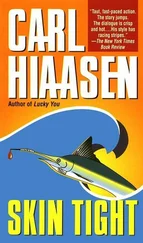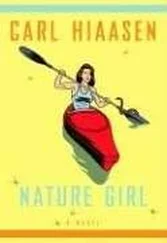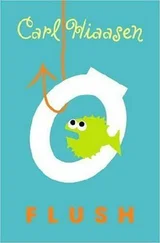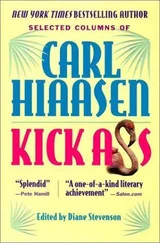Carl Hiaasen - A Death in China
Здесь есть возможность читать онлайн «Carl Hiaasen - A Death in China» весь текст электронной книги совершенно бесплатно (целиком полную версию без сокращений). В некоторых случаях можно слушать аудио, скачать через торрент в формате fb2 и присутствует краткое содержание. Жанр: Детектив, на английском языке. Описание произведения, (предисловие) а так же отзывы посетителей доступны на портале библиотеки ЛибКат.
- Название:A Death in China
- Автор:
- Жанр:
- Год:неизвестен
- ISBN:нет данных
- Рейтинг книги:3 / 5. Голосов: 1
-
Избранное:Добавить в избранное
- Отзывы:
-
Ваша оценка:
- 60
- 1
- 2
- 3
- 4
- 5
A Death in China: краткое содержание, описание и аннотация
Предлагаем к чтению аннотацию, описание, краткое содержание или предисловие (зависит от того, что написал сам автор книги «A Death in China»). Если вы не нашли необходимую информацию о книге — напишите в комментариях, мы постараемся отыскать её.
A Death in China — читать онлайн бесплатно полную книгу (весь текст) целиком
Ниже представлен текст книги, разбитый по страницам. Система сохранения места последней прочитанной страницы, позволяет с удобством читать онлайн бесплатно книгу «A Death in China», без необходимости каждый раз заново искать на чём Вы остановились. Поставьте закладку, и сможете в любой момент перейти на страницу, на которой закончили чтение.
Интервал:
Закладка:
The train to Xian was half full. As the Americans walked along the platform toward the soft-class cars, Stratton glanced up at the faces of the Chinese who were already aboard.
An old man with an elegant gray beard, squinting at the tourists. A plump matron with a baby on her shoulder and a toddler in her lap. A dour soldier.
And a stunning young woman with long black hair, tapping gently on the dingy window. Stratton smiled.
Kangmei.
From his private office in the national museum, Deputy Minister Wang Bin could gaze at the Forbidden City, a grand horizon, serrated by the gold-tiled rooftops of a dozen ancient temples.
His thoughts were sour. History taunted him. The architecture was inspired, ripe with passion. The city was full of such masterpieces.
But where did they come from? The ages, Wang Bin reflected sadly. The dynasties.
Where could one find such imagination now? And, worse, how could it nourish?
The thin man in the stuffed chair waited until the deputy minister turned from the window. "I'm deeply sorry we were not successful," he said in Chinese. "The cadres were clumsy, and their actions were dangerous. I would punish them but…
" He clasped his hands together.
"Both dead?" Wang Bin asked.
"One, yes. The other is badly injured."
Wang Bin asked, "Did Stratton leave on the train?"
"Yes," the thin man said. With nervous hands, he lit a cigarette.
"Liao and Deng are on their way to Xian?"
"The plane leaves in an hour," the thin man reported. "Their documents are in order. No questions were raised. Officially, they are joining the inventory team at the tombs."
Wang Bin rigidly walked to the sparse desk and sat down. His voice tightened.
"This is very delicate, you understand, Comrade Xi? Stratton has put us in a fragile posture. He is no ordinary tourist, I assure you."
Xi was soothing. "Deng is a trustworthy man. Have you ever known him to fail? In two days the threat will be gone, I am certain."
"I hope so," Wang Bin said, rising. "Now send in my visitor."
"The embassy has sent Miss Greer. She wants to apologize formally for Mr.
Stratton's inconsiderate change of heart. They have even offered to send an American soldier back with the casket." Xi grinned. "It's ironic, isn't it?"
"A thoughtful gesture," Bin said sarcastically.
The deputy minister was halfway to the door when Xi reminded him: "Comrade, your mourning band. Don't forget."
CHAPTER 9
"One of history's most pathetic lines was uttered in this city," J. Paul Prudoe was explaining. "It occurred in 1911, as the last dynasty, the Qing, was falling. The Qing were Manchu, of course, and the majority of Han people hated them as barbarian invaders. The Manchus imposed their rule in Xian with an army of occupation that occupied its own quarter of the city. When the people rebelled against the Manchus in 1911, there was a fearful slaughter. Many Manchus died. There was an English hospital here then and a few Manchus wound up there with dreadful self-inflicted wounds.
"An English doctor asked one of the wounded soldiers-his name is not recorded, alas-why he had attempted to slit his own throat. The soldier replied: 'Because the wells were full.' "
J. Paul Prudoe, erect in a stiffly pressed safari shirt and hair-by-hair perfect Van Dyke with an artful sprinkling of gray, paused for effect. He surveyed the room. Around him, twenty-three art historians waited expectantly.
" 'The wells were full.' Starting with the commanding general, an old man who realized that defense was hopeless, the Manchus had thrown themselves down the wells to avoid capture. The wells were thirty-six feet deep, and when they were full, a warrior's only honorable escape was to slit his throat. Subsequently, of course, the city is famous for the so-called Xian Incident, when the Communists caught Chiang Kai-shek in a farmhouse during the Civil War, but let him go.
During the last days of that war, the giant man-made hill-the tumulus of Emperor Qin, dead for more than two thousand years-was literally an armed camp, fortified with machine guns and snipers. How the muse of history must have smiled at that."
J. Paul Prudoe was the envy of America's art historians. He spoke with the zeal of a revivalist, the slick, contrived passion of a corrupt politician. His presence on the tour, tramping through museums and riding the buses like any ole AAH, was the celebrity magnet that had drawn so many of his nominal peers to China in the first place.
Stratton, slouched and alone at the rear of a reception room in Xian's Renmin Daxia Hotel, disliked Prudoe's showmanship as much as he despised his pop art scholarship.
"Now that I have your attention," Prudoe went on, preening, "let me talk about the Xian that really interests us, or Changan, as it was called then."
Stratton slurped his tea loudly enough to draw annoyed glances and an unspoken reprimand from Prudoe himself. Pompous ass. Stratton tuned out.
They had arrived before dawn, twenty hours from Peking. Twice Stratton had walked through the train looking for Kangmei. Twice guards had turned him back from the hard-class section of the train reserved for Chinese only.
But she had found him on the platform at Xian. They had shared a few quiet minutes in a corner of the terminal as the train disgorged its passengers with billowing steam and a slumbering pace.
"I have come to help," Kangmei had said.
"But… "
"You want to know what happened to make my father fight with my American uncle.
So do I. Alone you will never find out. I can help."
"How? How can you even be here? Don't you need a special pass?"
"Listen to me, Thom-as," she said with sober, almost childlike earnestness. "In China, many things are possible for Chinese. Not for foreigners"-she tapped him lightly on the chest-"but for Chinese."
Stratton smiled. She was proud of herself.
"China is the most wonderful land on earth, Thom-as, but it has been betrayed too many times. Everywhere there are old men who rule only because they are old, or cruel, or because they are friends of other stupid old men."
The crowd on the platform was beginning to thin. From somewhere near the terminal entrance, Stratton heard a petulant woman-it could only be Alice Dempsey-in full bay. "Now where can he have gotten himself to?"
"The old men sit on the young," Kangmei continued. "They are jealous because we have studied and they have not. They cling to power, betraying China and their own Communist ideals. These tired old men are everywhere, Thom-as. And everywhere there are also angry young people who believe in the New China. There are millions of us. We talk not to the stupid old men, not to the government, or the Party. We talk to one another. In Peking, in Shanghai, in Canton, here in Xian-everywhere. My friends and the friends of my friends. They will help me to help you."
"Stratton? Ah, there you are. Will you come on, please? Everyone is waiting. How can you be so rude?" Alice Dempsey's bray carried across half a hundred Chinese heads and echoed off the vaulted terminal roof.
Kangmei grabbed his arm.
"Go, Thom-as. In two hours, I will come to your hotel. Be ready."
With an empty smile for Alice, Stratton had docilely ridden the bus to the tourist hotel.
"… at Ban Po, a few miles out of town, we will see a well-preserved village belonging to the Yang Shao culture from about 6000 b.c. Xian did not come into its own, though, until the third century before Christ. The famous Emperor Qin, who unified China and built the Great Wall, had his capital here. We'll visit the new digs around his tomb east of the city… "
It certainly was something to think about, Stratton reflected. If anybody could actually harness the energies of the educated Chinese young people… no,
Читать дальшеИнтервал:
Закладка:
Похожие книги на «A Death in China»
Представляем Вашему вниманию похожие книги на «A Death in China» списком для выбора. Мы отобрали схожую по названию и смыслу литературу в надежде предоставить читателям больше вариантов отыскать новые, интересные, ещё непрочитанные произведения.
Обсуждение, отзывы о книге «A Death in China» и просто собственные мнения читателей. Оставьте ваши комментарии, напишите, что Вы думаете о произведении, его смысле или главных героях. Укажите что конкретно понравилось, а что нет, и почему Вы так считаете.






